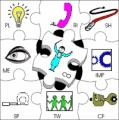
Belbins Team Roles
Dr Meredith Belbin defined a Team Role as:
"A tendency to behave, contribute and interrelate with others in a particular way."
Meredith's work identified nine clusters of behaviour, termed Team Roles. Each Team Role has its particular strengths and allowable weaknesses, and each has an important contribution to make to a team.
When you complete the Belbin® Self-Perception Inventory you will receive - among other reports - a ‘fingerprint' of your Team Role preferences. This can be completed online, whether for yourself or your team. Very few people display characteristics of just one Team Role. Most people have 3 or 4 preferred roles, which can be adopted or eschewed as the situation requires.
With the guidance and experience of a Belbin Trainer, Team Roles improve self-knowledge and understanding among individuals and teams. Team Roles depict a current behavioural pattern - a snapshot of your behaviour at one time - and in recognising these changes, you should look to complete Belbin Self-Perception Inventories throughout your career.
Belbin Team Workshops are of particular interest to:
- An existing team which needs to re-focus for a new challenge or strategy
- An existing team which works well and wishes to build on its success
- A new team aspiring to be a cohesive unit
- A team in the aftermath of major change or a re-organisation
- A problematic team, where conflicts are getting in the way of effectiveness
The team will:
- Learn about co-operation and diversity
- Learn how to promote strengths and handle weaknesses
- Enhance team building through communicating effectively
Individuals will:
- Find out how they contribute the most to the team
- Have a common language to help them give and receive feedback
FAQ's
What can be gained by identifying people's Team Roles?
- It is easier to work effectively with people when you are given some expectations of their tendencies and preferences. Self- and Observer Assessments give a greater understanding of how an individual behaves in a group situation.
Should I let people know my preferred Team Roles?
- Sharing your Team Role preferences enhances understanding and gives members of the team reasonable expectations of one other, helping to avoid disappointments and misunderstandings.
When I know my strongest Team Roles, what shall I do about it?
- You should take on and develop these roles as much as possible, because this is where you are likely to make your mark. You should also be aware of your lowest roles and find a strategy to avoid having to play them. Try to work with people with the opposite strengths and weaknesses to your own.
Call Unique Solutions now on 01629 691 691 to discuss your business needs with a Belbin accredited facilitator.

